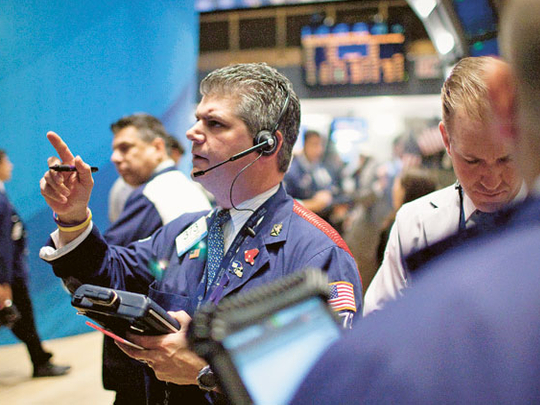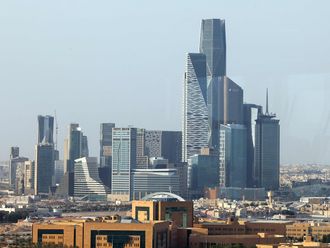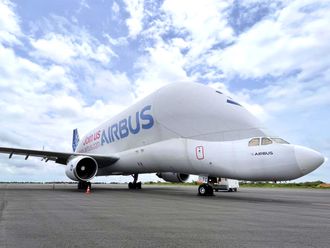
New York: US stocks tumbled in the worst Thanksgiving-week loss for the Standard & Poor's 500 Index since 1932 as concern grew that Europe's debt crisis will spread and American policymakers failed to reach agreement on reducing the federal budget.
Bank of America, Hewlett-Packard and Caterpillar dropped at least 7.6 per cent to lead declines in the Dow Jones Industrial Average. Energy stocks fell the most in the S&P 500 as oil declined for a second week and as Chevron lost 5.7 per cent after it was blocked from drilling in Brazil while the government probes a recent spill. Netflix slid 18 per cent after raising $400 million (Dh1.4 billion) to bolster cash.
The S&P 500 slid 4.7 per cent to 1,158.67, closing at the lowest level since October 7. The Dow fell 564.38 points, or 4.8 per cent, to 11,231.78 last week.
"We've resumed focus on the European debt issues," Terry L. Morris, senior equity manager at Wyomissing, Pennsylvania-based National Penn Investors Trust Co, said in a telephone interview. His firm manages about $2.2 billion. "The situation in Europe doesn't seem to be improving, which makes the market defensive," he said. "Spending cuts kicking in in the US will be a negative too because it will be a drag on economic growth."
Longest streak
The S&P 500 has fallen for seven days, the longest streak in four months, and has tumbled 7.6 per cent so far in November. US equities erased an early advance on the final session of the week as S&P lowered Belgium's credit rating and Reuters reported that Greece is demanding private investors accept larger losses on their debt. The cost of insuring Eur-opean sovereign bonds against default rose to a record last week as Germany failed to find buyers for 35 per cent of the bonds offered at an auction. German Finance Minister Wolfgang Schaeuble said market turbulence sparked by the euro region's sovereign-debt crisis will last for "a few months".
Congress' special debt-reduction committee failed to reach an agreement last week, setting the stage for $1.2 trillion in automatic spending cuts and fuelling concern that economic- stimulus measures that are set to expire will not be renewed. Still, S&P reaffirmed it would keep the US's credit rating at AA+ after stripping the government of its top AAA grade on August 5.
Revised figures
Stocks fell November 22 as revised Commerce Department figures showed that gross domestic product climbed at a 2 per cent annual rate from July through September, less than projected and down from a 2.5 per cent prior estimate. US stock exchanges were shut on Thursday for Thanksgiving and closed three hours early on Friday.
"The market's not trying to distinguish between stocks right now, it's focused almost exclusively on macro factors," John Linehan, director of US equities and a portfolio manager at T. Rowe Price Associates Inc, said at a press briefing on Tuesday in New York. "There's a tremendous amount of volatility in the marketplace. The market's on the gas pedal and the tyres are spinning, but we're really actually not going anywhere."
Companies most-tied to the economy fell, sending the Morgan Stanley Cyclical Index down 6.2 per cent, the most since the week ending September 23.











